Noah Max: String Quartets
It is remarkable not only that the London-based Noah Max (b. 1998) should have composed four string quartets by his mid-twenties; their stylistic range is also surprisingly wide. No. 1, which sets Jean Giono’s story ‘The Man who Planted Trees’, narrated here by Sir Michael Morpurgo, has distant roots in English pastoralism, but the refracted lines, furtive colours and ecstatic textures of Nos. 2 and 3 are much closer to European modernism, with echoes of Kurtág and Ligeti. No. 4 is a wild ride, its manic, swirling rhythms interrupted by passages of whispered intimacy that eventually draw it into silence.
Sir Michael Morpurgo, narrator
The Tippett Quartet
Listen To This Recording:
String Quartet No. 1 “The Man Who Planted Trees”, Op. 25
- I. Andante desolato (10:10)
- II. Maestoso; expansive (8:04)
- III. Vivo (6:12)
- String Quartet No. 3, Op. 41 (10:44)
- String Quartet No. 4, Op. 45 (15:37)
String Quartet No. 2, Op. 37
- I. Andante glaciale (6:02)
- II. Intensamente con ira (8:11)
- III. Unearthly; mesmeric (3:44)
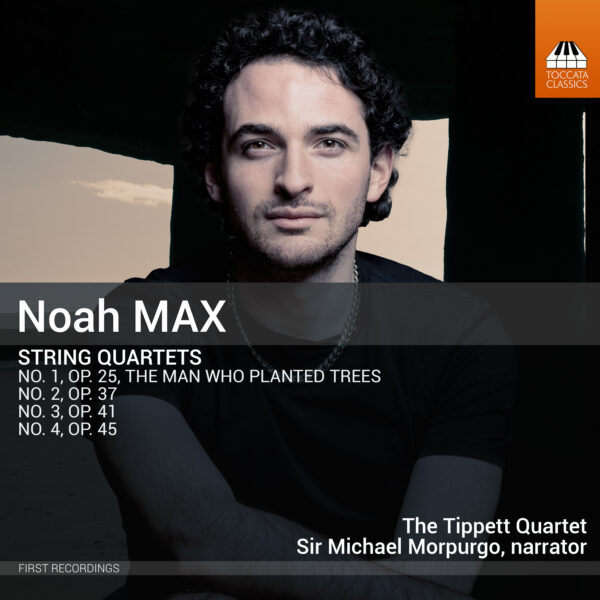
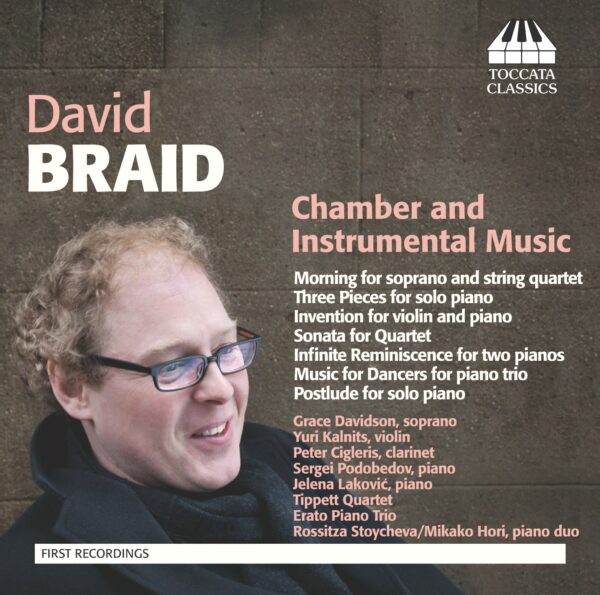
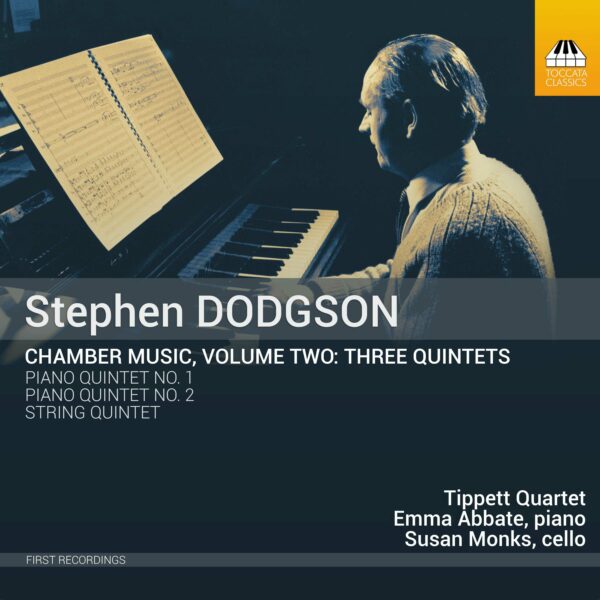
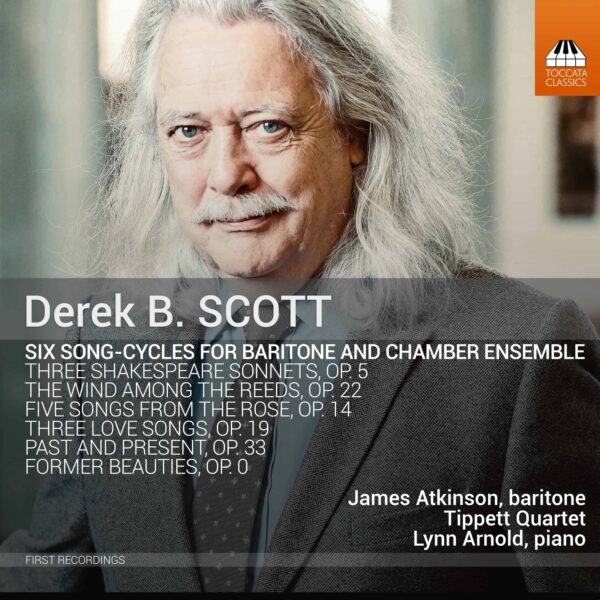
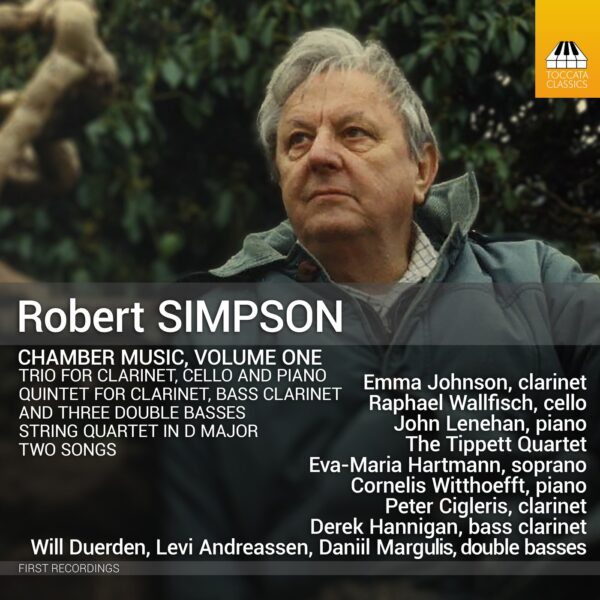
Classical Source :
‘Max’s highly descriptive, richly melodic language carries its own unmistakable harmonic signature [in the first quartet]. […]
throughout the album you only really hear Max’s distinctive voice. […]
given the excellence of the performances and the sound of the 24/192 download or stream, this is a fascinating release that repays repeated listening.’
—Rob Pennock, Classical Source
The Arts Desk :
‘One of this disc’s attractions is hearing again the voice of novelist Michael Morpurgo on narrating duties. […] Combining speech and music is a tricky business, but the balance here feels right; Giono’s gradual marvelling at how “men could be as effectual as God in realms other than that of destruction” reflected in the radiant finale. […]
[Tippett Quartet’s] confident, incisive playing is superb throughout the disc. […] Exciting, accessible contemporary chamber music, and highly recommended.’
—Graham Rickson, The Arts Desk
Planet Hugill :
‘[The narrator and string quartet in the first quartet] creates a striking synthesis. […]
The quartets on the new album are four of his strongest pieces and he feels close to them.’
—Robert Hugill, Planet Hugill
Pizzicato :
‘The Tippett Quartet’s performance is characterized by intense and balanced playing that result in clear musical renditions. Technically sophisticated and eloquent, they deliver finely tuned interpretations that clearly highlight Max’s different approaches to the theme.’
—Pál Körtefa, Pizzicato
Yorkshire Times :
‘This compelling new release showcases the remarkable compositional talents of Noah Max, featuring four string quartets performed with exceptional skill by The Tippett Quartet. Max, described by The Sunday Times as “a fizzing creative fuse,” delivers works that are inventive, intense, and vividly expressive. […]
[In QWuartet No.1,] The Tippett Quartet creates a rich, textural soundscape that transports listeners alongside a weary traveller in this allegorical tale about Elzéard Bouffier’s selfless restoration of a desolate French valley. Max employs pizzicato and thoughtful harmonic structures to sensitively portray the drama, while the quartet’s articulate phrasing and dynamics enhance the profound environmental message.
The remaining three quartets are equally impressive, though distinctly different in character. […]
The third [quartet] evokes a mother’s grief for her lost child through micropolyphony and complex metric shifts, creating a sound world of profound mournfulness. […]
Throughout the album, Max demonstrates a remarkable ability to convey meaning through varied string techniques, creating emotional tension through staccato passages and shifting timbres that invite reflection after each piece concludes. The program notes provide valuable context for understanding the narrative resonance behind each composition.’
—Andrew Palmer, Yorkshire Times
Fanfare :
‘Max is a born melodist […].
Max’s melodic talents are fully on display [in the first quartet] […] Max’s processes are absolutely stringent enough that the piece would survive sans narrator; but the power here is remarkable. […] The Tippett Quartet’s control in the second movement is as impressive as their accuracy in the finale as the music, finally, starts to dance. […]
The opening [of the third quartet] is unique and beautiful: a short, descending motif is heard in close canon against glassy harmonics. Skillfully, Max engineers the music to coalesce on an A-Minor chorale, withheld in its fullest form until after the work’s main climax. Listen, too, to his use of repetition, how he skillfully “warms” a phrase. Fascinating, as is the sheer expertise of the Tippett Quartet in the (surely) pppp closing measures. […]
Performances then, of supreme command, both interpretatively and technically, of music from a maximally-talented composer (no pun intended, honest).’
—Colin Clarke, Fanfare
Ritmico :
‘Interesantes, equilibradas y bien grabadas interpretaciones del siempre eficiente Cuarteto Tippett junto al recitador y narrador Sir Michael Morpurgo.’
English translation:
‘Interesting, balanced, and well-recorded performances by the ever-efficient Tippett Quartet, accompanied by narrator Sir Michael Morpurgo.’
—Justino Losada, Ritmico